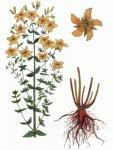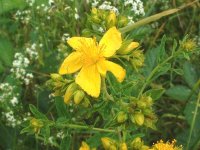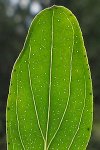St. John's wort (pierced) - hypericum perforatum l.
Hypericum perforatum L.
The botanical characteristics. Family mammal. A perennial herbaceous plant from 30 to 80 cm. Stem erect, green, then reddish-brown color. Leaves opposite, elliptic, with translucent dots - "holes". The fragrant golden yellow flowers are collected in inflorescence shirokometelchatye. Flowers in June-August. Fruit - oblong brown box, ripen in July-September.
Spread. Distributed throughout the European part of Russia, in Western Siberia. Prefers forest edges, bright field, growing along the roads, as a weed - in orchards and gardens.
Used parts of the plant.
The above-ground part of the plant (grass) collected at the beginning of the flowering phase.
The plant contains tannin, essential oils, flavonoids (hyperoside, rutin, quercitrin, izokvertsitrin, quercetin), vitamins (C, PP, carotene, nicotinic acid), anthocyanins, alcohols, alkaloids, pigments and resins.
Application.
One of the most popular medicinal plant. It has a tonic, anti-inflammatory, hemostatic and astringent.
It is used in asthenic conditions, neurosis and neurasthenia, insomnia and headaches. Anti-inflammatory effect and boleutolyayusche with sciatica.
St. John's wort herb has antispasmodic effect and stimulates the activity of the heart, is used for myocarditis and endocarditis.
St. John's Wort is prescribed for diseases of the gastrointestinal tract (gastritis, gastric and duodenal ulcer disease, enterocolitis, diarrhea, ulcerative colitis, hemorrhoids), liver and gall bladder (gall bladder dyskinesia, cholecystitis, cholelithiasis, acute and chronic hepatitis).
It is used as a diuretic and anti-inflammatory agent for glomerulonephritis, pyelonephritis, cystitis, inflammation of the prostate gland.
In folk medicine, St. John's wort is used even for diseases of the joints - the exchange, infectious and rheumatic etiology; with nonhealing wounds, ulcers and fistulas, acute respiratory diseases, tuberculosis, hay fever, and the children's diathesis.
St. John's Wort herb is widely used for the treatment of tumors, with different kind of inflammatory processes of female genital sphere. It is given as an anthelmintic, they also treat bedwetting in children. Grass has photosensitizing properties, that is, increases the skin's sensitivity to ultraviolet rays and is used in the treatment of vitiligo.
St. John's Wort is prescribed and as an external agent: for rinsing in diseases of the nose, throat and mouth, for douching with belyah, bath, in the form of ointments and compresses for burns, to accelerate the healing of wounds and bedsores.
The surgery used preparations of the herb St. John's wort - imanin and novoimanin.
For its versatile therapeutic properties of St. John's wort is popularly considered a magical plant before.
Contraindications. The herb St. John's wort slightly toxic. With prolonged use in its pure form can cause discomfort in the liver and bitterness in the mouth. St. John's Wort increases the number of blood pressure, people suffering from hypertension, it is prescribed only in gathering herbs in small doses. Also, due to the fact that in the literature there are reports of some side effects in long-term ingestion of St. John's wort preparations made at home, it is recommended to use home-made products only externally. Inside ready to use drugs only on prescription, and according to the instructions supplied with the drugs.
Preparation:
- 1 tablespoon of herbs insist with 1.5 cups of boiling water. Drink 1/3 cup 3 times for 20-40 minutes before meals. For outdoor use are preparing a more concentrated infusion (2-3 tablespoons of herbs to 2.0 cups of boiling water).
- St. John's wort tincture is prepared at the rate of 1:10 for 70-degree alcohol, take 30-50 drops with 1/3 cup of water into or used to rinse the throat and mouth.
- Butter with herb St. John's wort - an excellent antibacterial agent for the home kit, especially when treating children. They smeared the wounds, burns and abrasions, as well as buried in the nose by a few drops 2-4 times a day for acute respiratory infections, nasal dryness, for the prevention of influenza.
Oil prepare it as follows. Take 1 tablespoon of dry grass St. John's wort, calendula flowers, eucalyptus leaves and 400 ml of vegetable oil (preferably olive). Bring to a boil and boil over low heat, covered for 10-15 minutes. Filter. Store in the refrigerator. Cast a little of the total weight, and heated before use, is used to treat.
In homeopathy used Hyperieum 3, 3, 6, as well as St. John's wort ointment as an external agent. Assign with injuries, except when small tissue damaged nerves, is effective in concussion of the spinal cord. As analgesic and wound-healing effect reminiscent of arnica and often follows it. Indicated for the shooting pain of neurological character, as an external agent in the form of an ointment for the treatment of thrombosis and venous leg ulcers.





Comments
Commenting, keep in mind that the content and the tone of your messages can hurt the feelings of real people, show respect and tolerance to his interlocutors, even if you do not share their opinion, your behavior in terms of freedom of speech and anonymity offered by the Internet, is changing not only virtual, but real world. All comments are hidden from the index, spam control.